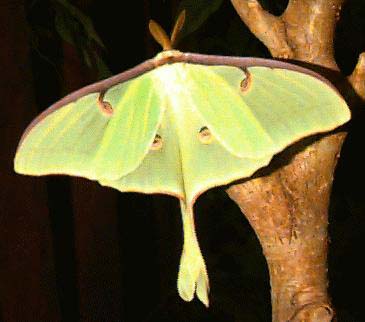
Photo courtesy
of Scott Henninger |
BILL'S ACTIAS LUNA NOTES
I keep records from year to year on flight times,
eclosions, foodplant preferences,
rearing difficulties, etc..
My observations/summaries are entered below.
Livestock of this species and several other species is usually available
in the fall.
Click on LIVESTOCK to see a price list.
|
|
2000 Season Summary
May 16: Lunas have been
flying in New Jersey since last two weeks in April. We are having
a late spring on Prince Edward Island and
I have yet to take lunas out of cold storage.
I plan on taking six out on May 20 (done),
anticipating June 7-10 eclosion dates. As of June 9, I have had no eclosions (keeping it cool in
house-cold outside).
First wild male came into light on June 8 and I put him in cage with unhatched cocoons which began emerging
a week later than expected. I only obtained one
mating with a wild male.
I received an email that lunas were successfully reared in California on eucalyptus.
May 22: I took eight lunas out today and
will take out remainder on May 29.
I took two wild females at lights in Lochabar Mines, N.S. in late June and to my great surprise
took a female at lights in
Pennfield , New Brunswick, as late as July 16.
1999 Season Summary
May 10: I took 6 luna cocoons out of storage. A male
(wide red lateral body stripe) eclosed in
am of May 30
Female eclosed May 31.
Male eclosed June 1. Wild males were flying in late May and I took a
female at light last week
in May: Male luna came in around 10:45 on 28th;
female same night around 11:30 (only deposited a few ova on 28th after bagging).
May 17: I took 12 luna out of cold storage today:
Moths began eclosing about 18 days out of cold storage.
May 29: Male luna came into
light.
June 13-16: Many male lunas were coming in to lights in Sheet Harbour, Nova Scotia.
I also obtained matings on P.E.I. in mid
June.
1998 Season Summary
We are having an early spring so I have taken some cocoons out of storage MAY 9.
The first eclosion was a
female 19 days later on May 28. This female mated with a wild male on
a very cool night, May 30. The day, however, was very warm and three
females emerged in an
outdoor cage. This cage has been put
out on warm days and taken in at night where indoor temperatures were in the low 60's.
Lunas were flying in
Nova Scotia from third week in May.
I had one successful mating in Nova
Scotia on June 6. Males regularly come in to scenting females around 12:30 a.m..
Lunas continued to eclose at roughly 19-23 days out of cold
storage.
The last P.E.I. pairing was on June 18 of a female who had eclosed a few days
earlier. Cold and
rain prevented earlier pairings.
New Brunswick light trap samplings for 1998 took 22 specimens from June 10 to July 18.
My first
brood lunas began emerging in early August and readily paired in an indoor cage.

| Cocoons of this species are usually available in the fall.
Click on
LIVESTOCK to access link to a price list, some rearing articles, an
email contacts list, etc., and
navigate from there,
or you can click on any of the species listed below for quicker access
to files with pictures and information.
GOTO HOMEPAGE
|


